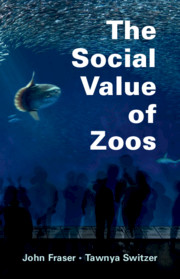Book contents
- The Social Value of Zoos
- The Social Value of Zoos
- Copyright page
- Contents
- Figures
- Tables
- Preface
- Acknowledgments
- Chapter 1 Context
- Chapter 2 Ontology
- Chapter 3 Learning
- Chapter 4 Morality
- Chapter 5 Pleasure
- Chapter 6 Meaning
- Chapter 7 Bonding
- Chapter 8 Connectedness
- Chapter 9 Identity
- Chapter 10 Activation
- Chapter 11 Impact
- Chapter 12 Integration
- References
- Index
Chapter 8 - Connectedness
Animals, Continuity, and Belonging
Published online by Cambridge University Press: 26 March 2021
- The Social Value of Zoos
- The Social Value of Zoos
- Copyright page
- Contents
- Figures
- Tables
- Preface
- Acknowledgments
- Chapter 1 Context
- Chapter 2 Ontology
- Chapter 3 Learning
- Chapter 4 Morality
- Chapter 5 Pleasure
- Chapter 6 Meaning
- Chapter 7 Bonding
- Chapter 8 Connectedness
- Chapter 9 Identity
- Chapter 10 Activation
- Chapter 11 Impact
- Chapter 12 Integration
- References
- Index
Summary
Nonsocial emotional and mental impacts of on-site nature stimulus experiences also emerge as a common theme when people describe zoos and zoogoing. Chapter 8 thus delves into what is known about mental models of connectedness, continuity, and belonging that appear to be linked to empathy, guilt, concern, and care – emotional responses that often arise automatically when humans encounter live animals. In addition to a psychological exploration of ions of nature and the concept of biophilia, we highlight patterns of affiliation, caring, and connectedness that emerge in zoo settings to shed light on the extent to which experiences that spark empathy toward animals can facilitate the development of moral emotional responses likely to ground or reinforce a conservation ethic. Building on primary research about the implicit connections people tend to develop during zoo visits – irrespective of the fact that zoo spaces are clearly human-designed – we demonstrate that zoo experiences overall impact humans’ capacity to connect and extend their scope of care to nonhuman entities in important ways. In particular, we consider why and how rich emotional relationships between zoo animals and the staff who care for them can and should be at the forefront of efforts to facilitate emotional connections to animals and caregiving that might build on and inform zoo users’ existing ideas, concerns, and motivations.
Keywords
- Type
- Chapter
- Information
- The Social Value of Zoos , pp. 107 - 130Publisher: Cambridge University PressPrint publication year: 2021



